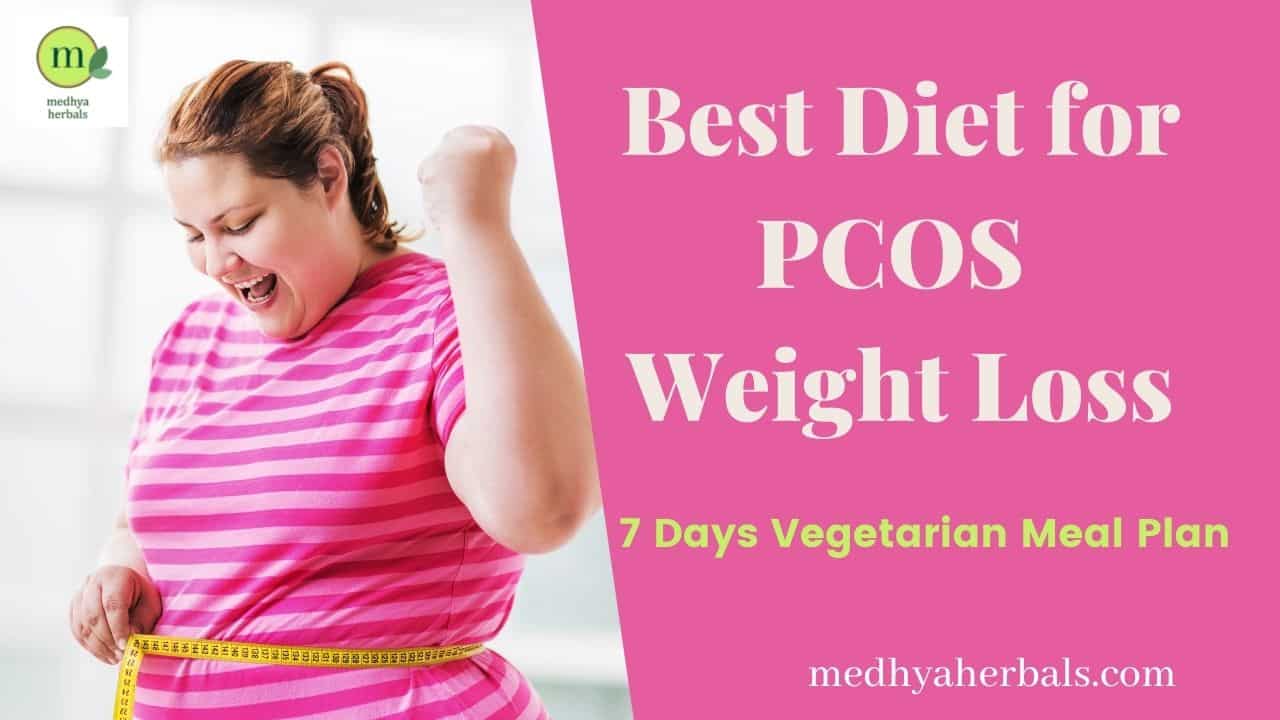If you have been diagnosed with PCOS, then you may have plenty of questions around the foods that you can eat or the ones that you should avoid.
You may be wondering whether you need to change your diet altogether, eat more proteins, carbs or take a look at the expensive supplements? Or perhaps, how you can lose weight with PCOS?
So, here it is for you! An effective PCOS meal plan is the one that you can follow consistently to achieve your specific health goals.
The best diet for PCOS is one that will truly nourish your body, establish hormone balance back and fix your metabolism to attain a healthy weight. And this is what we are going to discuss in this post.
You will get to know the wholesome natural foods that support hormone balance, ovulation and insulin sensitivity in your body. And how you can make PCOS diet plan a success for your PCOS treatment.
Also, you will find here a 7 days PCOS meal plan to promote fertility, lose weight and begin your healing journey from PCOS.
This is your ultimate guide to reverse PCOS with your diet and foods. Let’s go!!
What is Polycystic Ovary Syndrome?
Polycystic ovary syndrome, or PCOS, is a common hormonal condition that affects the functioning of a woman’s ovaries.
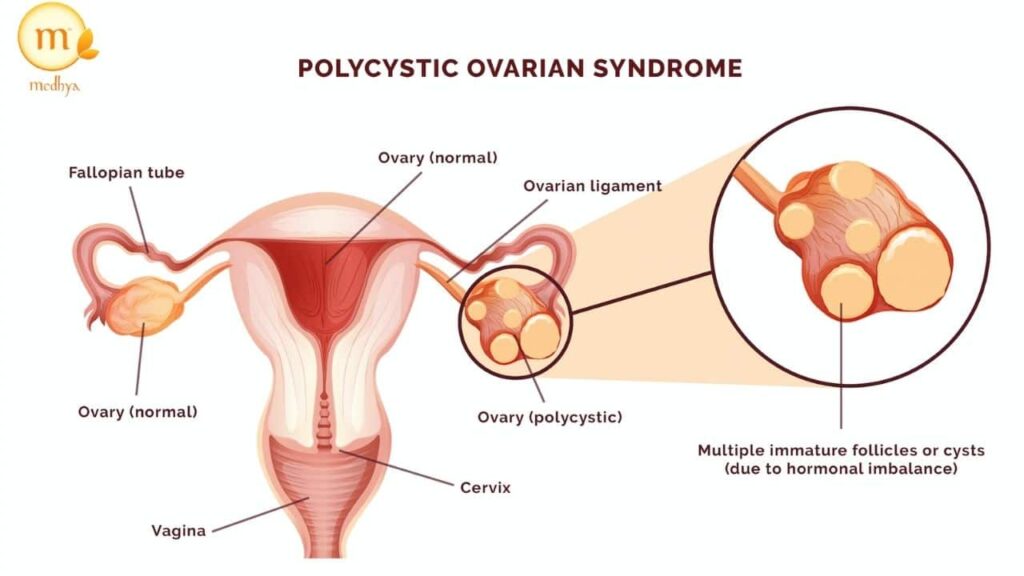
Insulin resistance, obesity, genetic predisposition, environmental factors, etc, can further aggravate PCOS.
The symptoms of PCOS as can be seen in a person who is suffering from it include weight gain, diabetes. Further complications include increased risk of heart problems, endometrial cancer, endometrial hyperplasia, and many more. And of course, infertility is a major complication that arises from PCOS.
Another major characteristic of PCOS is the presence of multiple cysts in the ovaries.These cysts are due to multiple immature eggs in the follicles. They cannot be released, so they store up over time, and might cause the ovaries to be enlarged.
PCOS Symptoms
PCOS is characterized by an imbalance of sex hormones and can lead to a number of health issues, including weight gain, irregular periods, difficulty conceiving, and other complications. The higher the androgen levels are, the worse the symptoms of PCOS.
- Anovulation (inability to produce eggs)
- Irregular Periods
- Infertility
- Weight gain (obesity)
- Cysts on the ovary;
- Terrible acne on the face, chest, back, etc.
- Hair loss and male pattern hair growth
- Long terms complications like heart problems, Metabolic Dysfunction, and Type II Diabetes
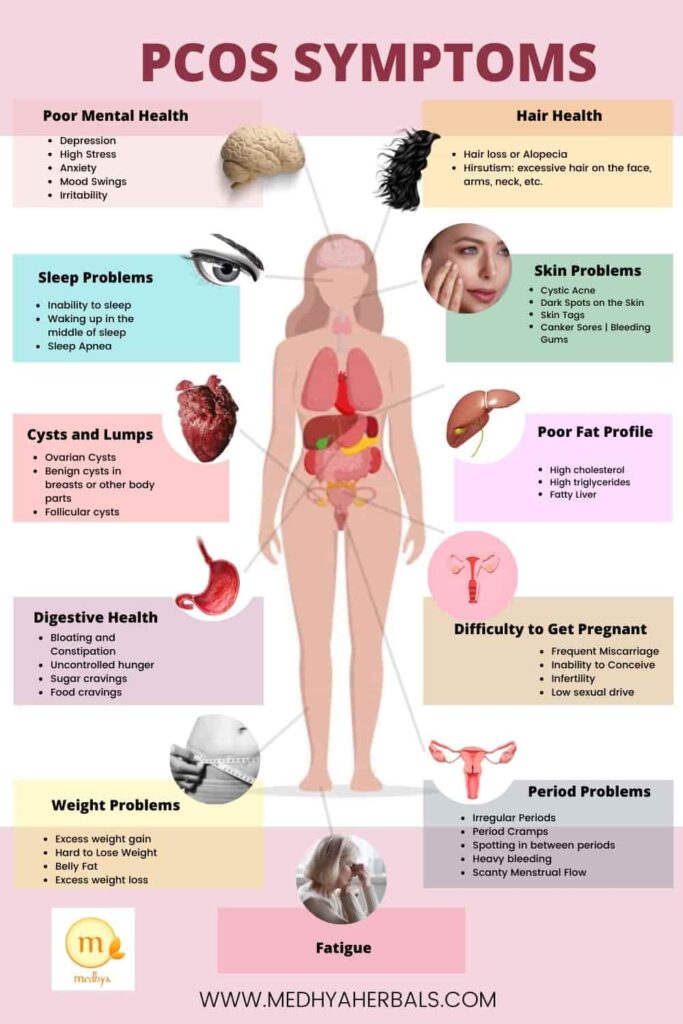
The Role of Diet for PCOS Natural Treatment
When it comes to natural treatment options for PCOS, then your diet should be your first handle. This is because, PCOS is not a disease.
It is a cluster of symptoms, which arise due to metabolic and hormonal imbalance in the body.
And you know what?
To address anything related to metabolism and hormones, diet and lifestyle are the most helpful options, which also give long term success!
In the case of PCOS, we need to break the cycle of insulin resistance, which leads to poor metabolism, hormone imbalance, and hyperandrogenism (high Androgens).
Now, since the levels of Insulin highly depend on what we eat, we can regulate our diet to keep high Insulin levels in check.
When balanced insulin response is achieved, then your other hormones and androgens also start falling in place. Thus, the vicious cycle of PCOS is broken.
Now that you have understood the root cause of PCOS symptoms, let’s move on to our goal here – PCOS Meal Plan and Foods to balance hormones in PCOS.
PCOS Diet Chart
Stubborn PCOS Weight can be reduced by maintaining an energy deficit. This means, you take in lesser calories (without starving yourself) than you burn during the day. If you eat fewer calories than you burn up, your body will not store fat. Therefore, it is advisable to keep a meal diet chart and count the calories for few initial days to get a sense of what you are currently consuming.
Eventually, it becomes a higher level of awareness about your diet and nutrition.
Do keep in mind, less calories do not mean that you should go on dieting. It simply means that you should eat mindfully with smaller proportions and avoid grazing all the time. This will naturally help to turn your body to a LEAN form.
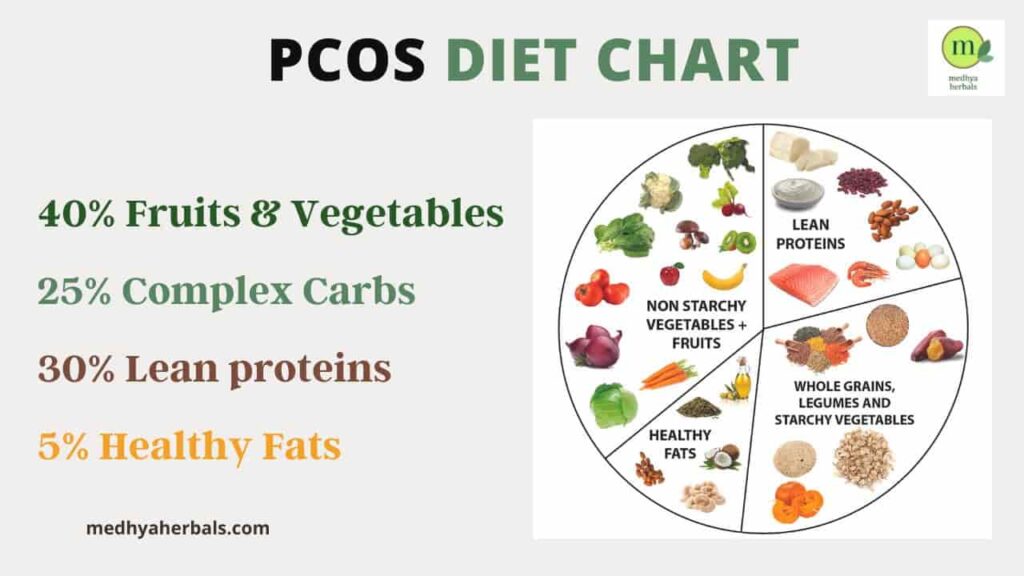
Here is your diet chart on meal proportion and distribution:
40% of Meal Portion should be Fruits, vegetables, and fiber-rich foods.
25% of Meal Portion should be Complex Carbs as Whole grains, cereals, and starch-based food products
30% of Meal Portion should be Lean proteins such as lentils, beans, eggs and lean meats
5% of Meal Portion should be Healthy Fats
Best Foods for PCOS Diet Meal Plan
Now let’s look into the best foods that you should include in your PCOS diet and some of the worst foods that you should avoid for PCOS natural treatment. We will start by looking into the macro nutrients that should form the major portion of your meals in a PCOS Meal Plan.
1. Complex Carbohydrates to support your Metabolism and Gut Health
The glycemic index (GI) is a measure of how rapidly blood sugar levels rise after taking a meal.
If you take food with high GI as simple carbohydrates present in white bread, sugar and heavily processed fast foods, then the blood sugar levels rise rapidly.
Consequently, there is a corresponding increase in the levels of insulin in the blood. High levels of insulin in the blood sets up a chain of reactions that aggravate the polycystic ovarian syndrome.
On the other hand, low GI foods such as complex carbohydrates slowly release glucose in the blood. This keeps your blood sugar levels balanced, thus avoiding insulin spikes and dips along with.
Thus, complex carbs help to improve insulin sensitivity, your metabolism and consequently weight loss. They will keep you full, provide B Vitamins and essential minerals.
There’s also a bonus! With complex carbohydrates, you’ll have some moderate amount of sugar in your body system for longer. This helps to reduce sugar cravings.
The Complex Carbs to fit into your PCOS meal plan
- Whole grains such as Bulgur, Rye, Quinoa, Brown Rice, Whole Oats, and Millets
- Legumes such as Beans and Lentils for proteins
- Vegetables with variety of colors to give you fibre, vitamins, minerals, and antioxidants
- Fruits
- Nuts
- Seeds
Simple Carbohydrates that you should avoid in PCOS Diet Plan
Avoid carbohydrate foods with a low glycemic index. They can cause your blood sugar levels to spike in a very short time. Also, avoid simple carbohydrates. These carbs to avoid include:
- Potatoes
- Sugar in all forms
- French-fries
- Polished and processed white Rice
- Pasta
- Bread
- Candy and other sweets
- Soda
2. Fruits and Vegetables
Plant based foods are rich in antioxidants that have anti-inflammatory properties. They help to mitigate symptoms like fatigue, which present in cases of PCOS. Here are some ways in which fruits and vegetables support weight loss and recovery from PCOS.
- Fruits and vegetables usually contain a lot of fibre, which is not digested quickly. As a result, they remain in the stomach for much longer. This helps to keep you satiated and reduces your food cravings.
- They contain high amounts of nutrients as vitamins, minerals and antioxidants without loading you up with calories. So, you get more nutrition and satiation from less food. This tames food cravings and reduces insulin levels.
- Fruits and veggies that are not so sweet and non starchy are low GI. Thus, they help to promote insulin sensitivity in your body and reduce insulin resistance.
- Essentially, high-fibre foods help to reduce the risk of being overweight or obese, or to manage it if you already are.
Foods that promote Ovulation and help balance the Hormones
- Broccoli, Cauliflower, Brussels sprouts, cauliflower, Cabbage
- Leafy greens, including red leaf lettuce and arugula
- Green and red peppers, Carrots, Mushrooms, Beets
- Beans and lentils
- Plums, apples, grapefruit, oranges, Pears, peaches
- Almonds
- Sweet potatoes
- Winter squash, Pumpkin, Gourds
- Drumstick leaves, Curry Leaves
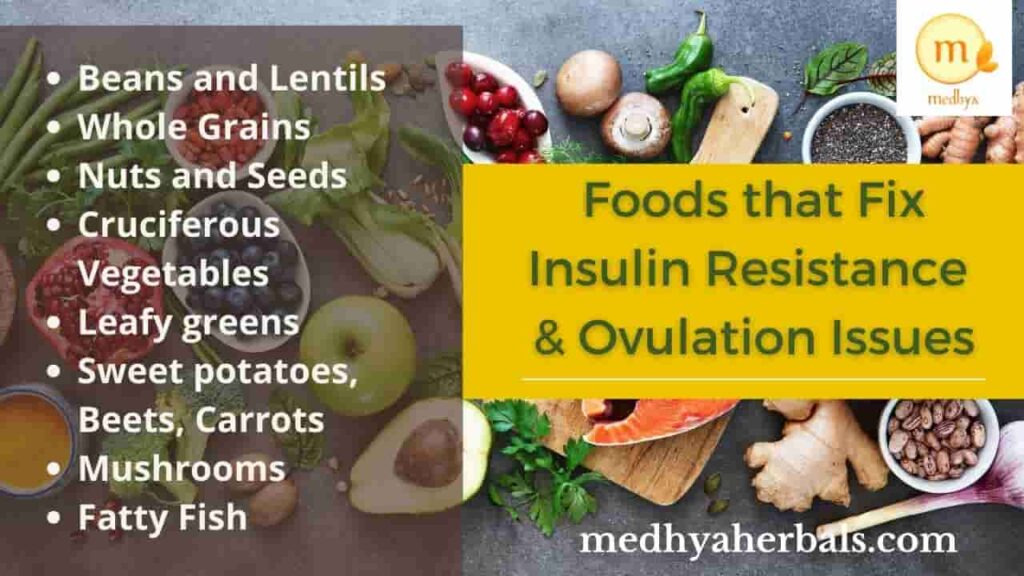
These vegetables are also high in fibre, Vitamins, and Minerals that women with PCOS lack in their diet.
Fruits and vegetables to avoid
These would be fruits that are excessively sweet and starchy vegetables. Watch out for those and limit your intake of them. Some examples are:
- Processed fruits in the form of canned, cut and juiced fruits with additives
- Excessive consumption of very sweet fruits as banana, mango, coconut, durian and jack fruit
- Excess of tubers and starchy vegetables as potato, sweet potato, butternut squash
3. Healthy Fats
But I’m trying to lose weight, why should I take more fats?
Well, first you should understand that fats are not as bad as many people take them to be. What you just have to ensure is that you take the right kind of fats.
Embrace healthy fats. Omega-3 fatty acids, for example, are a good kind of fats.
Omega 3 – Healthy fats that Balance your Hormones and Promote Ovulation
- Salmon
- Tuna
- Sardines
- Mackerel
- Nuts
- Seeds
- Avocados
- Pure oils such as Extra virgin Olive Oil, Ghee, Coconut Oil, Sesame Oil, and Mustard Oil
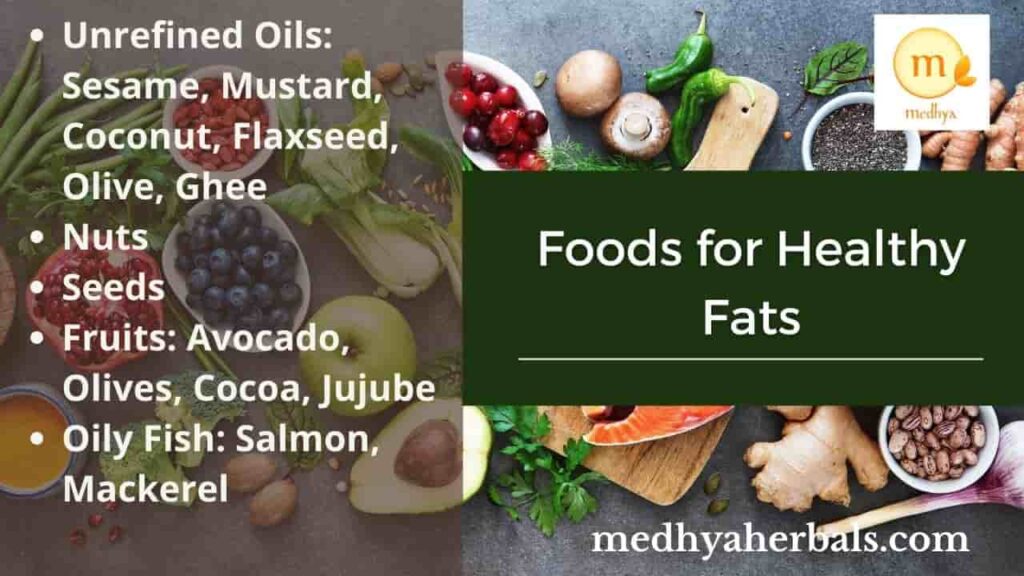
Avoid saturated trans fats. These are detrimental to someone on a PCOS meal plan to lose weight. Here are some examples:
- Overly processed meat
- Red meat
- Donuts
- Frozen pizzas
- French fries
- Fast foods like hamburgers, etc.
- Margarine
- Refined Oils
4. Proteins in PCOS Meal Plan
Proteins in your diet promote satiety levels. You feel less hungry and less often. This supports weight loss, reduces food cravings, prevents binge eating, and of course the after guilt factor!
Proteins not only help to build body tissues, they are also the building blocks for several hormones and your bones. Hence, having sufficient proteins in your diet is important to increase the strength and elevate your energy levels.
Where can you find proteins? You can readily find them in dairy, fish, meat, and eggs. Again, you want to avoid the overly processed ones.
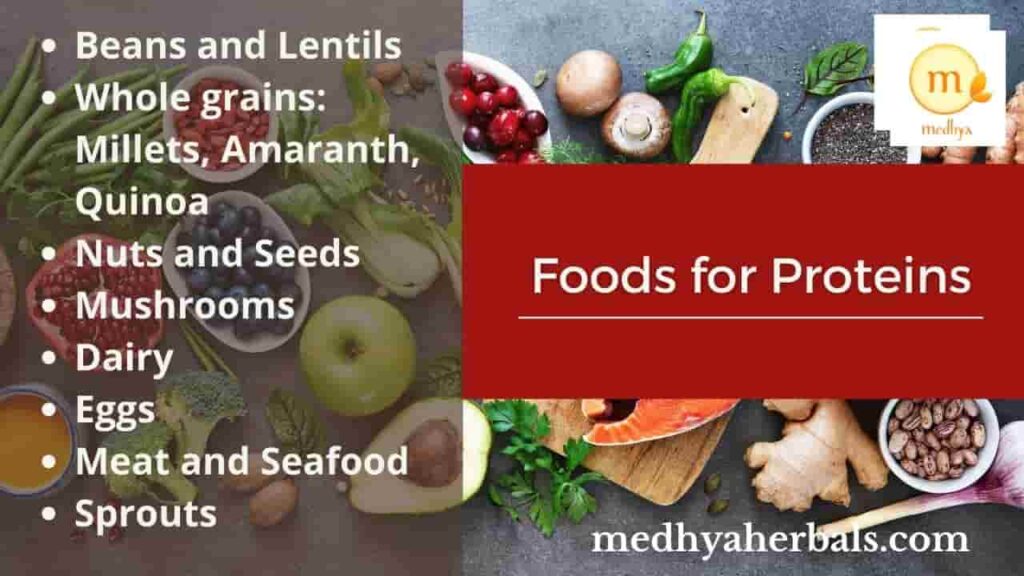
Protein foods to eat
Lean proteins sources are recommended.
- Beans
- Lentils
- Whole Grains as Quinoa, Brown Rice, Amaranth and Millets
- Vegetables as cauliflower, broccoli, green beans and green peas
- Sprouts
- Eggs
- Turkey
- Chicken
- Dairy
- Tofu
- Fish
- Nuts and Seeds
5. Support your Gut-Health and Mood with Probiotic Foods
You have been taught that micro-organisms cause diseases. That’s true, but not all of them!
There are some microbes in the body system that are essential to keeping us healthy. The mouth has its flora, the gut also has its flora, as well as other places in the body. These communities of microbes carry out activities that help the body of the human in which they are hosted.
However, poor dietary choices can hamper their functioning.
If they are disturbed or destroyed, they can no longer support us as they are supposed to.
Truly, science proves that women with PCOS have less diversity in the community of micro-organisms that are living in their gut.
Have we talked enough about sugar yet? Here’s one more. Sugar messes with this balance of microorganisms in the gut.
If you are to help these tiny little creatures to help you, then you have to eat what suits them.
Help those microorganisms with fermented foods that suit a PCOS diet plan
These all help the natural community of microbes in the gut to thrive.
- Coconut yogurt
- Pickles
- Kombucha
- Sauerkraut
- Kimchi
- Miso
- Tempeh
Some other foods would be Prebiotics that act as the food for your gut flora.
6. Developing Awareness about PCOS Diet
Of course, isn’t that what we’ve been saying all along? Ever heard the statement, “you are what you eat?”
Well, the tip is this: when you purchase food items, read the labels where available. Take note of what is in it and the percentage/weight present. This helps you keep track of how much of what you are about to take.
Stimulants? Alcohols? You shouldn’t be thinking too much about that. Caffeine shouldn’t be anywhere near the top of your list. That’s if it’s even there at all.
Sugar, sugar, sugar. Sugar everywhere. Be wary of sugar. Avoid it.
Eat Timely Meals
Stay regular with your Meals – Do not Linger to Binge Later On! In fact fix your meal times and stick to it as you would for any other important task. This helps your body system a lot!
Eating at set times gives your body a clock to work with – your hunger levels will be balanced and your satiation level will improve.
Don’t go for too many hours without eating! This helps to reduce the urge to snack or to indulge in binge eating. This also helps to keep blood sugar levels stable.
This is specially true for the window in between your lunch and dinner. If you know that you are running a little late at work on any specific day, then grab a healthy snack such as a fruit or some nuts.
This will help you to carry on till you reach home and provide with enough energy to be able to prepare a meal rather than binging on whatever comes in your way!
Getting Help that You Need
The nature of your work doesn’t allow much time to keep track of what you eat? Well, remember this is for the best. Health comes first. But that said, work out a way to ensure you still eat healthily. Contact a specialist dietitian for a PCOS diet chart if you have to.
You might have financial restrictions, that’s all right. You can still eat healthy without going way over budget. Work with recipes available for you. Buy straight from local farms. That’s even best because that’s the surest way to get natural unprocessed food.
Note which nutrients give you adverse reactions, and which ones relieve your PCOS symptoms. In the end, each person is unique.
Like breaking an addiction, stopping old habits to be faithful to your PCOS meal plan can be difficult.
It can be made easier when you have people who are sharing the same struggles to relate with.
Find PCOS diet support groups in your local area. Together, you can work towards overcoming this Polycystic Ovarian Syndrome.
Regular Physical Activity
Back up the Oomph of PCOS Meal Plan with Exercise!
Eating the right foods and diet without any form of exercise will only take you that far! Physical activity is another handle that you should include in your daily routine. It will further promote weight loss, tone up, and strengthen your body.
It has been proven time and again that changing lifestyle habits can go a long way in managing PCOS.
No! You don’t have to become an Olympic weight lifter.
Rather, you just need to exercise regularly and be consistent with it. Even a modest exercise such as thirty minutes of morning walk daily can do wonders.
Here’s an exercise plan and details on best exercises for weight loss in PCOS.
Worst Foods to Avoid from Your PCOS Meal Plan
Having considered what to eat to mitigate PCOS, let us now consider what to not eat in case of PCOS. Again, the diet is focused on keeping insulin levels low, and weight management.
- Reduce your consumption of processed carbohydrates like pastries, white bread, etc.
- Take less carbohydrates. Generally, women who take less carbohydrates have a better chance at ovulation.
- Avoid consuming too much of red meat as in steaks, pork, hamburger, etc.
- Do not take food containing too much sugar. Check the label for labels like high fructose corn syrup, sucrose, dextrose. These are sugars, and you should be wary of them.
- Pasta noodles that have semolina or durum are high in sugar, and should be avoided.
- Avoid solid fats. They are add to break down. Solid fats can be found in margarine, lard, etc. On a whole, mind the fat you take. With fats, the two Q’s are important, I.e. quality and quantity both.
These lists are far from exhaustive, but it should give you a good idea of what to embrace and what to shun.
7 Days PCOS Meal Plan
Having learned the best and worst foods for PCOS, you might wonder how to do it. How do you combine these food items? How do you ensure you’re getting enough nutrients without getting on the wrong tracks?
Here is a 7 days PCOS Meal plan for you:
Day 1
Breakfast: Beets Stir-fry + millets porridge
Lunch: 1 Bowl brown rice + Cowpeas soup + Cucumber Salad
Dinner: Thai Green Curry + 1 Bowl brown rice
Day 2
Breakfast: Apple Cinnamon Oats Porridge
Lunch: 1 Bowl brown rice + sprouted Mung Dal + green salad
Dinner: 1 Bowl millets + Mixed vegetables stir-fry
Day 3
Breakfast: Scrambled Eggs with Herb muffins
Lunch: 1 Bowl brown rice + Lentils soup + ½ bowl curd
Dinner: Vegetable Khichadi or Porridge
Day 4
Breakfast: Vegetables stir-fry + 1 Bowl millets porridge
Lunch: 1 Bowl brown rice + Basil Tofu Scramble + green salad
Dinner: 1 Bowl barley + Mixed Vegetables
Day 5
Breakfast: Apple Cinnamon Oats Porridge
Lunch: 1 Bowl brown rice + Sprouted Beans curry + cucumber salad
Dinner: 1 Bowl millets + Green beans stir-fry
Day 6
Breakfast: Mung Dal Dosa (Pancake) with Mint Chutney
Lunch: Bowl brown rice + Spinach Daal + ½ bowl curd
Dinner: 1 Bowl whole wheat porridge with fresh vegetables stir-fry
Day 7
Breakfast: Scrambled Eggs with Herb muffins
Lunch: Vegetable Quinoa + green salad (stir-fry)
Dinner: Vegetable Khichadi or Porridge
Morning/Evening Snack Options
Add on these PCOS healing snacks in between your meals should you need to. It will help you to keep you your hunger levels in check while supporting hormone balance:
- Roasted Black Gram
- Nuts and dried fruits (limited amount)
- Sprouts
- Berries
- Handful of sunflower seeds or pumpkin seeds
- Hummus and fresh vegetables as celery or carrots
- Cucumber slices
- Lemon water or coconut water
- Apple Beets and Celery Juice
Takeaway
To adopt the best PCOS meal plan is to adopt the on that is best for you. You will also enjoy all the benefits of eating healthy.
You will finally be relieved of that acne ruining your face. The hirsutism excessive hair growth in inappropriate places will stop, and your hair will stop falling out. Bye-bye to obesity and abnormal weight gain. Your periods will become more regular and less painful. You will finally be able to hold your own baby in your own hands.
So, when are you getting started?
Below you can download PCOS Diet plan pdf version for reference. If you need further support to follow the diet plan or considering Ayurvedic treatment to manage or treat PCOS Naturally, do contact us here, we will help you out.
Frequently Asked Questions
1. Should I adopt the ketogenic diet in my PCOS meal plan?
The ketogenic diet is a high-fat, low-carbohydrate diet that has gained popularity for weight loss and metabolic health. Some studies suggest that it may be beneficial for individuals with PCOS, as it can improve insulin sensitivity and hormonal balance.
However, it's important to note that the ketogenic diet may not be appropriate or necessary for everyone with PCOS. While reducing carbohydrate intake can be beneficial for managing insulin resistance, it's important to ensure that the diet is balanced and meets your nutritional needs.
Here are some considerations to keep in mind when deciding whether or not to adopt a ketogenic diet for PCOS:
- Consult with a healthcare professional: Before starting any new diet, it's important to consult with a healthcare professional to determine if it's appropriate for you and to develop a personalized plan.
- Monitor your nutrient intake: The ketogenic diet is high in fat and low in carbohydrates, which can make it challenging to meet your daily nutrient needs. It's important to ensure that your diet includes a variety of nutrient-dense foods such as vegetables, protein sources, and healthy fats.
- Be mindful of potential side effects: The ketogenic diet can cause side effects such as fatigue, nausea, and constipation. It can also be difficult to maintain in the long term, and some individuals may experience weight regain after stopping the diet.
- Consider a modified approach: A modified ketogenic diet that includes a moderate amount of carbohydrates and emphasizes whole, nutrient-dense foods may be more sustainable and provide similar benefits to a strict ketogenic diet.
Ultimately, the best diet for PCOS is one that is balanced, nutrient-dense, and tailored to your individual needs and preferences.
2. Which Milk is Best for PCOS? Can you drink milk in PCOS Meal Plan?
Milk is a complete food that provides with ample nutrition in the form of healthy fats, proteins, carbohydrates, Vitamins, and Minerals. However, when it comes to PCOS, you should limit your consumption of dense foods and instead focus on toning yet nutrient dense foods that can support your recovery from PCOS.
Avoid all form of heavily processed, UHT, and flavored milk and dairy options. If you can digest milk (without any digestive problems), then prefer whole and fresh milk in limited quantity.
3. Which vegetable oil is good for PCOS Meal Plan?
When it comes to selecting vegetable oils for a PCOS meal plan, it's important to choose oils that are low in saturated and trans fats and high in monounsaturated and polyunsaturated fats. Here are some good options:
- Olive oil: Olive oil is rich in healthy monounsaturated fats and contains antioxidants that can help reduce inflammation. It's a great choice for cooking, salad dressings, and marinades.
- Avocado oil: Avocado oil is a good source of heart-healthy monounsaturated fats and has a high smoke point, making it suitable for high-heat cooking methods such as sautéing and grilling.
- Coconut oil: While coconut oil is high in saturated fat, it contains medium-chain fatty acids that can be beneficial for some individuals with PCOS. However, it's best to use it in moderation and choose virgin coconut oil, which is less processed than refined coconut oil.
- Canola oil: Canola oil is low in saturated fat and high in healthy monounsaturated and polyunsaturated fats. It has a mild flavor and is versatile for cooking, baking, and salad dressings.
It's important to remember that while these oils can be healthy choices, they are still high in calories and should be used in moderation as part of a balanced diet.
4. Are all fruits okay for PCOS Meal Plan?
Most fruits are generally okay for a PCOS meal plan, as they are a good source of fiber, vitamins, minerals, and antioxidants. However, some fruits have a higher glycemic index, which means they can cause a rapid rise in blood sugar levels. High blood sugar can lead to insulin resistance, which is a common issue for individuals with PCOS. Therefore, it's important to choose fruits with a lower glycemic index.
Fruits that have a lower glycemic index include:
- Berries (such as strawberries, raspberries, blueberries, and blackberries)
- Apples
- Pears
- Peaches
- Plums
- Oranges
- Grapefruit
- Kiwi
- Melons (such as watermelon, cantaloupe, and honeydew)
Fruits with a higher glycemic index that should be consumed in moderation or avoided altogether include:
- Bananas
- Mangoes
- Pineapples
- Grapes
- Dried fruits (such as dates, raisins, and figs)
In general, it's recommended to choose whole fruits over fruit juices, which can be high in sugar and lacking in fiber. It's also important to remember that while fruits are healthy, they should be consumed as part of a balanced diet that includes a variety of other foods, such as vegetables, lean proteins, and whole grains.
5. What Causes Weight Gain in PCOS?
More than 70% the women with PCOS experience excessive weight gain or obesity. What’s causing it? When we take a deeper look into the problem, we find that the sole reason for stubborn weight in PCOS is: Metabolic Dysfunction as a result of Insulin Resistance
Insulin is the primary hormone that guides our metabolism and blood sugar levels. It converts and stores excess sugar in the blood in the form of fat, so that it can be used as a fuel later on. If insulin hormone is working fine, then when we eat insulin will be secreted in our body as appropriate for the composition of the diet. But, when we indulge in faulty lifestyle and diet for too long, then we get prone to improper functioning of insulin, known as insulin resistance. It disturbs our body’s metabolism and causes classical symptoms of PCOS as weight gain, constant fatigue and high cholesterol levels. Here, you can find more information on insulin function and weight loss with PCOS.
Insulin also affects a woman’s reproductive system hormones as Estrogen and Progesterone. Thus, insulin resistance has a detrimental effect on a woman’s reproductive function, menstrual cycle and fertility. Other hormones that are affected by insulin resistance are the Androgens, the so called “male hormones”, like Testosterone for example. High Insulin levels in the body which result from Insulin resistance lead to high Androgens, which give classical PCOS symptoms.
6. Can you do Intermittent Fasting for PCOS Treatment?
Intermittent fasting is a type of eating pattern where you cycle between periods of eating and fasting. While some studies suggest that intermittent fasting may be beneficial for weight loss and improving insulin sensitivity in some individuals, there is limited research on the effects of intermittent fasting specifically in women with polycystic ovary syndrome (PCOS).
In some cases, intermittent fasting may exacerbate symptoms of PCOS, such as irregular periods or hormonal imbalances, and may not be appropriate for all women with the condition. It's important to speak with your healthcare provider before starting any new diet or eating pattern, including intermittent fasting, to ensure that it is safe and appropriate for your individual needs.
References
Moran, L. J., Hutchison, S. K., Norman, R. J., & Teede, H. J. (2011). Lifestyle changes in women with polycystic ovary syndrome. The Cochrane Database of Systematic Reviews, (7), CD007506. https://doi.org/10.1002/14651858.CD007506.pub3
Gudmundsdottir, S. L., Flanders, W. D., & Augestad, L. B. (2019). Physical activity and fertility in women with polycystic ovary syndrome: A systematic review. BMC Women's Health, 19(1), 71. https://doi.org/10.1186/s12905-019-0763-7
Ingerski, L. M., Homan, K. J., & Markenson, G. (2016). A systematic review of the health and healthcare disparities for women with polycystic ovary syndrome. Human Reproduction Update, 22(6), 717–726. https://doi.org/10.1093/humupd/dmw024
Tang, T., Lord, J. M., Norman, R. J., & Yasmin, E. (2012). Balancing ovulation and anovulation: Intermittent fasting alters menstrual cycle in women with polycystic ovary syndrome. Journal of Translational Medicine, 10(1), 1–6. https://doi.org/10.1186/1479-5876-10-79
Szczuko, M., Zapałowska-Chwyć, M., Drozdowicz-Jastrzębska, E., & Starczewski, A. (2019). The Role of Diet in the Treatment of Polycystic Ovary Syndrome—A Systematic Review. Nutrients, 11(4), 936. https://doi.org/10.3390/nu11040936

